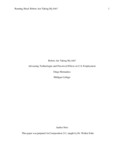| dc.description.abstract | Recent U.S. economic data, along with controversial reports of the expected economic future have only furthered fueled the ongoing debate on technological unemployment and its perceived influence on the years to come. Even its existence stays in constant contention and debate amongst economist. However, most discussion on the topic centers around possible repercussions in the economy, such as mass technological unemployment. However looming this this unemployment appears to some, it does not hold high priority at the moment because the future needs to play out for analysts to obtain a better sense of the economic environment ahead. Overall most experts, agree that no matter the perceived impact, technological unemployment currently exists to some extent, which gives some reason to look into possible policy options in case of unexpected economic distress. | en_US |

